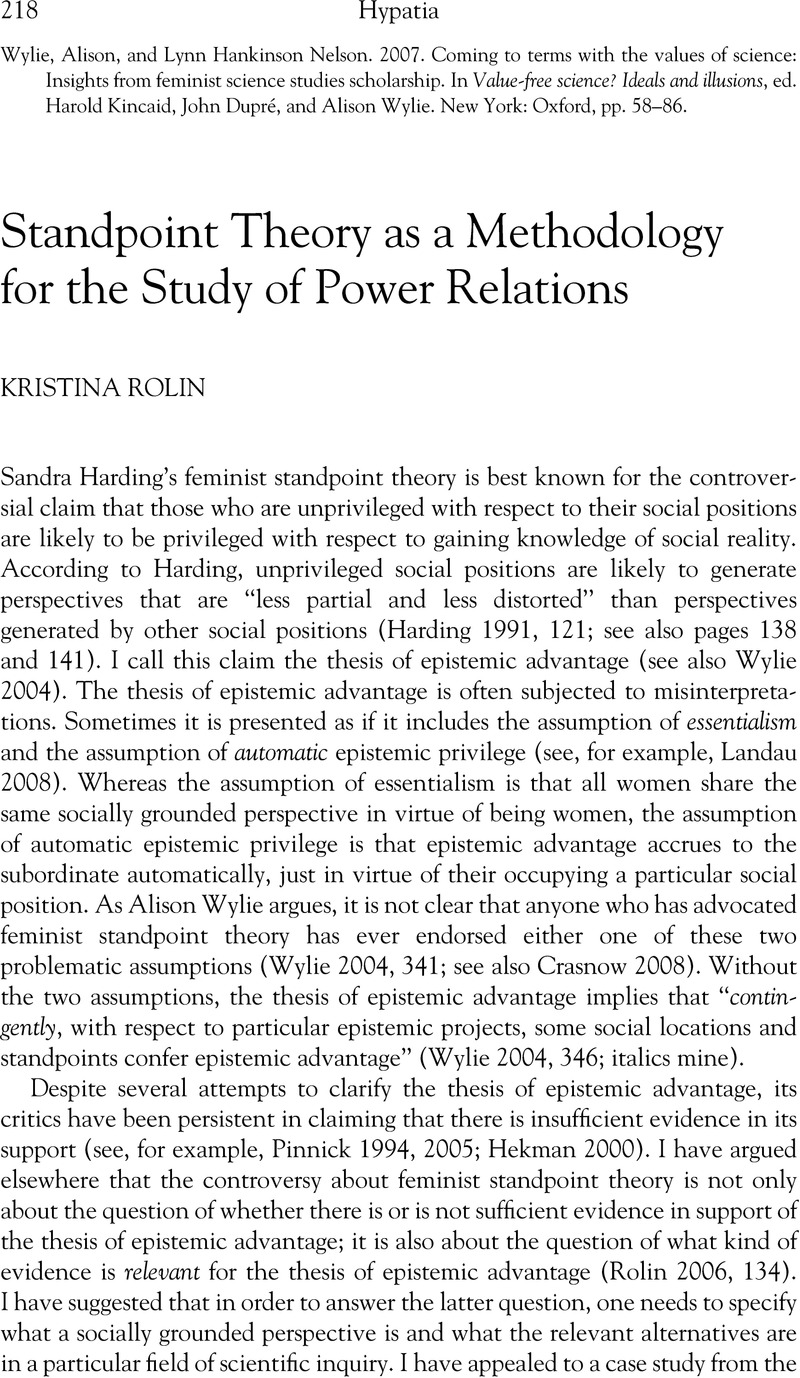Crossref Citations
This article has been cited by the following publications. This list is generated based on data provided by Crossref.
Watson, Matthew C.
2011.
Cosmopolitics and the Subaltern.
Theory, Culture & Society,
Vol. 28,
Issue. 3,
p.
55.
Rolin, Kristina
2011.
Diversity and Dissent in the Social Sciences.
Philosophy of the Social Sciences,
Vol. 41,
Issue. 4,
p.
470.
Crasnow, Sharon
2013.
Feminist Philosophy of Science: Values and Objectivity.
Philosophy Compass,
Vol. 8,
Issue. 4,
p.
413.
Amoretti, Maria Cristina
and
Vassallo, Nicla
2013.
EPSA11 Perspectives and Foundational Problems in Philosophy of Science.
p.
467.
Ellington, Tameka N.
2015.
Social networking sites: a support system for African-American women wearing natural hair.
International Journal of Fashion Design, Technology and Education,
Vol. 8,
Issue. 1,
p.
21.
Curtin, Nicola
Stewart, Abigail J.
and
Cole, Elizabeth R.
2015.
Challenging the Status Quo.
Psychology of Women Quarterly,
Vol. 39,
Issue. 4,
p.
512.
Tapson, Christine
2016.
Counselling and professionalism: A phenomenological analysis of counsellor experience.
The European Journal of Counselling Psychology,
Vol. 4,
Issue. 2,
p.
148.
Fenton, Angela
Walsh, Kerryann
and
MacDonald, Amy
2016.
Global Co-Mentoring Networks in Higher Education.
p.
203.
Rolin, Kristina
2016.
Meta-Philosophical Reflection on Feminist Philosophies of Science.
Vol. 317,
Issue. ,
p.
133.
Rolin, Kristina
2016.
Values, standpoints, and scientific/intellectual movements.
Studies in History and Philosophy of Science Part A,
Vol. 56,
Issue. ,
p.
11.
Macnamara, Jim
2016.
Multiple intelligences and minds as attributes to reconfigure PR—A critical analysis.
Public Relations Review,
Vol. 42,
Issue. 2,
p.
249.
Warner, Leah R.
Settles, Isis H.
and
Shields, Stephanie A.
2016.
Invited Reflection.
Psychology of Women Quarterly,
Vol. 40,
Issue. 2,
p.
171.
Phelan, Kate M.
2017.
A Question for Feminist Epistemology.
Social Epistemology,
Vol. 31,
Issue. 6,
p.
514.
Breede, Deborah Cunningham
2017.
The International Encyclopedia of Communication Research Methods.
p.
1.
Mutari, Ellen
2018.
Metaphors, social practices, and economic life: ASE presidential address.
Review of Social Economy,
Vol. 76,
Issue. 1,
p.
1.
Rudd, Jill E.
and
Hughes, D. Timothy
2019.
Negotiation Preparation in a Global World.
p.
54.
Bennett, Nolan
2019.
Unwillingness and Imagination in Frederick Douglass'sThe Heroic Slave.
The Review of Politics,
Vol. 81,
Issue. 2,
p.
281.
Peters, Rebecca Warne
2019.
Front-line work and interpretive labor in an Angolan development program.
Critical Policy Studies,
Vol. 13,
Issue. 4,
p.
414.
Matney, Bill
2019.
A Knowledge Framework for the Philosophical Underpinnings of Research: Implications for Music Therapy.
Journal of Music Therapy,
Vol. 56,
Issue. 1,
p.
1.
Arnold, Nadine
2019.
Die Produzenten in moralisierten Märkten.
Zeitschrift für Soziologie,
Vol. 48,
Issue. 1,
p.
70.



